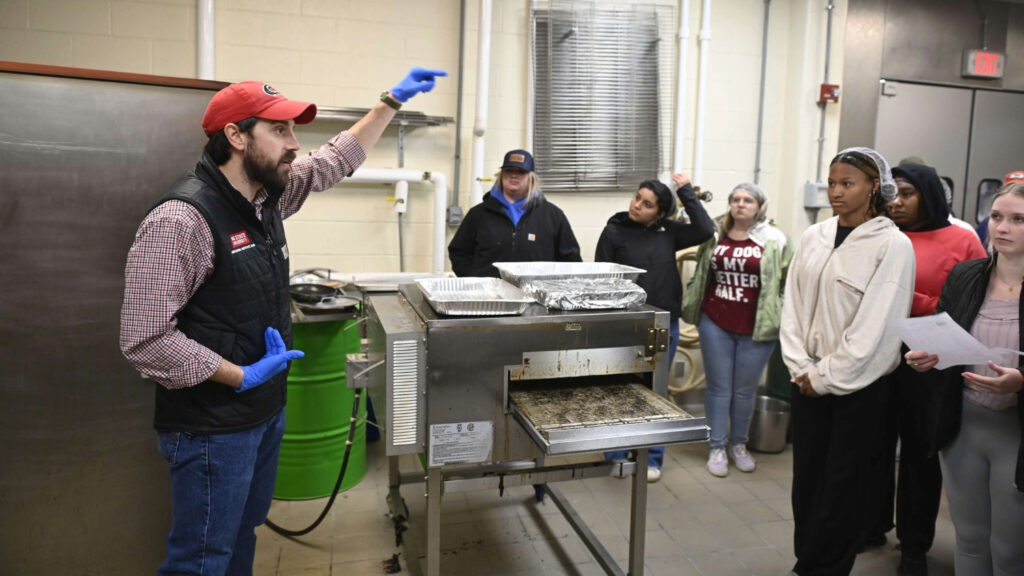Create Learner-Centered Course Content Design with Course Mapping Express Grants

NC State instructors looking to address specific pedagogical challenges related to learning technology can apply for a semester-long DELTA Express Grant. Pairing DELTA learning technology expertise with faculty innovation, these grants foster greater student success in classes across the university through creative course improvement initiatives.
DELTA offered two new express grant types last fall: Course Accessibility, which provides support to instructors working to remove barriers to equitable access in their courses, and Course Mapping.
For the Course Mapping Express Grants, DELTA experts partner with faculty to create a visual representation of how the learning objectives, materials, activities and assessments of a course align with its learning objectives. The process encourages learner-centered backward design principles, starting with the course completion learning objectives in mind, to help build more meaningful learning experiences.
Best practices in course design demonstrate that the process of course mapping is indicative of a course’s long-term success, which in turn informs future curriculum design.
Course mapping grants are versatile. While they are particularly useful for online or hybrid courses, they can be applied to fully in-person courses as well. Similarly, they can be used for new curriculum development or applied to existing courses with the aim of improved alignment between activities and outcomes.
The process can be highly beneficial to students as well. Though not all instructors choose to share their course map with their students, doing so offers the students a visual representation of how everything they do in a course has a purpose and what that purpose is.
Mapping NC State Courses
There were four DELTA Course Mapping Express Grants completed during the inaugural 2023-2024 academic year, with the following NC State faculty and courses:
- Edeoba Edobor, Agribusiness Marketing, Agricultural Business Management (ARE 312)
- Renee Harrington, High Intensity Fitness, Health Exercise Studies Fitness (HESF 113)
- Currey Nobles, Introduction to Meat and Poultry Processing, Animal Sciences (ANS 241)
- Tommy Stephenson, Introductory Geomatics, Biological and Agricultural Engineering (BAE 325)
Working with DELTA’s Course Quality team, these instructors engaged in semester-long course mapping projects guided by the principles of Quality Matters (QM). QM provides NC State instructors with foundational knowledge of high-quality course design best practices. In fact, the updated QM Higher Education Rubric (7th edition) has made course mapping a required element for course review.
All four NC State instructors rated their experience collaborating with DELTA as outstanding and felt the process met or exceeded their expectations.
Currey Nobles was awarded a grant for his Introduction to Meat and Poultry Processing course, which covers basic concepts of meat processing operations and technology for students in this high-need industry. Nobles found the overall organization of the mapping process to be clear and organized. The most helpful resources, he said, were the example course map and Moodle templates.

“The course map helped me to realize that a large portion of my class content was not addressed in my learning objectives,” Nobles explained. “This exercise helped me elucidate the connection between overall learning objectives and individual activities and exercises in the class. I will definitely share the course map with my next class.”
For Renee Harrington, mapping her High Intensity Conditioning course was so beneficial that she went on to map her other courses as well. She posts her course maps to Moodle for students to reference throughout the semester.
“Through completing the DELTA Course Mapping Express Grant I have become more reflective in my teaching,” Harrington said.
She also has a much stronger emphasis on clear communication with her students. “I have greater intentionality for enhancing student understanding of course alignment between learning objectives and assessments, and in how I communicate that to the students,” she said.
“This process helped me to revise and enhance other course materials to ensure there is a description of the alignment of the activity with a learning outcome in the course.”

Explore DELTA Course Mapping Resources
DELTA’s Teaching Resources website includes a comprehensive section on Overall Course Design, where instructors can find guides, resources, and strategies for designing courses. Instructors interested in course mapping can learn more from the following resources:
Course Mapping Tutorial: In this YouTube video tutorial, DELTA’s LearnTech team goes over key components in a course map, guiding viewers through the process of creating one step by step.
Guiding Students to Success with a Course Map: This asynchronous workshop helps you ensure that the components of your course work together to enable students to achieve learning objectives with step-by-step instructions and a template for course alignment.
Use a Course Map Template: Plan out your course and ensure alignment of course components with this course map template.
NC State Course Mapping Guide: This document offers a visual representation of a completed example course map.
Want to take the next step in building meaningful learning opportunities for your students? DELTA Course Mapping Express Grants are offered twice a year, with the next application cycle open from August 19 – September 6, 2024. The grants come with a $2,000 stipend and DELTA staff support including workshops, consultations, action plan templates and additional resources.
- Learn more about DELTA Course Mapping Express Grants.
- View our DELTA Express Grants FAQ page for information about grant eligibility, the review process and general inquiries.
- Email deltaexpressgrants@ncsu.edu with specific questions.


